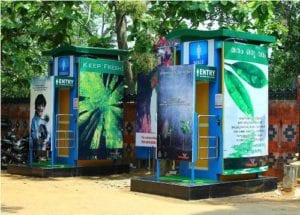The Department of Science and Technology (DST) and the Bill and Melinda Gates Foundation (BMGF) have entered into a collaboration on sanitation innovation solutions for South Africa.
A memorandum of understanding – “Partnership in the Demonstration of Sanitation Solutions in Rural and Peri-urban South Africa”– was announced in India at this year’s “Reinvent the Toilet” Fair. The DST wishes to fund the research, development, demonstration and manufacturing of sanitation technologies and solutions in South Africa, with the underlying objective of ensuring universal access to sanitation. The BMGF’s Water, Sanitation and Hygiene (WSH) programme focuses on developing innovative approaches and technologies that can lead to radical and sustainable improvements in sanitation in the developing world. The DST has committed R30 million to do field tests on technologies developed as part of the BMGF’s global Reinvent the Toilet Challenge in rural communities and schools. The BMGF is contributing US$1 million to support this testing. “By applying creative thinking and innovative approaches to sanitation challenges, we can dramatically improve the health of women, children and communities. We have no doubt that this new partnership with the Government of South Africa will help us achieve this,” said Chris Elias, president of the Global Development Programs of the BMGF. “We believe that the pairing of South Africa’s governmental leadership with new business models and innovative sanitation solutions will dramatically increase the progress that has already been made in tackling the global sanitation crisis.” Today, 2,5 billion people do not have access to safe toilets, which is deleterious to the health and well-being of children. It also undermines women and girls’ dignity and safety, and hinders economic development and growth. Through the DST-BMGF partnership, the Department seeks to provide alternative, non-sewer sanitation solutions to communities in South Africa that will not have access to water-borne sanitationin the short and medium term.Sanitation in South Africa, particularly in the rural and peri-urban environment, remains a huge challenge despite significant strides made to reduce the sanitation backlog since 1994. The situation has been exacerbated by population growth over the same period. The South African National Sanitation Strategy (2005) set out the aim of universal access to sanitation by 2010, in line with the Millennium Development Goals.
Delivery of sanitation in South Africa is the responsibility of the Department of Human Settlements (DHS), with the DST– according to its mandate– providing and demonstrating research and technology solutions that can assist the DHS in meeting its objectives and goals of proper sanitation for all. Through these technologies and by learning from the initiatives of the DST and BMGF partnership, the DST will be in a position to provide evidence-based advice to the DHS to inform policy regarding this basic service, which provides people with dignity, through policy briefs and structured South African Government engagements. As part of its commitment, the BMGF will support the deployment of “next generation” toilets in South Africa for field testing over the next two years (2014 and 2015). In 2011, the WSH programme initiated the Reinvent the Toilet Challenge to bring new and sustainable sanitation solutions to the 2,5 billion people worldwide who do not have access to safe, affordable sanitation. These toilets aim to remove germs and parasites from human waste, and recover valuable products such as energy, clean water and fertiliser. It will operate “off the grid”, without connections to water and sewer systems or electrical lines, and will cost less than US$0,05 cents per user per day. The DST has committed funds to undertake proper monitoring and evaluation of the identified technologies to advance this project and has partnered with the Water Research Commission to implement the initiative. In terms of rural school sanitation, the technologies will be demonstrated in the Cofimvaba district in the Eastern Cape as part of the Tech4RED (Technology for Rural Education Development) project. The technologies will also be demonstrated in the 23 district municipalities that have been identified by the South African Government as critical in terms of service delivery.






